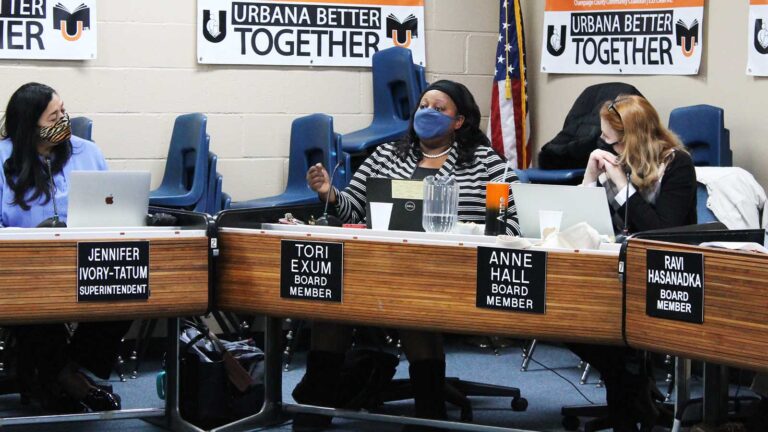URBANA — Urbana High School students and staff may soon walk through AI-powered metal detectors to get to class.
The District 116 Board of Education spent Tuesday night debating whether to install the new technology, called Evolv Express.
Superintendent Jennifer Ivory-Tatum told the board that rising community violence has left staff drained.
“They’re doing patrolling and supervision and trying to stay in front of one more thing happening every single day,” Ivory-Tatum said. “If we don’t do something, we’ll continue to lose good people, because it’s so stressful right now — you guys don’t even imagine.”
Violent crime rose nationwide in 2020 after a long period of decline since the 1990s, largely due to pandemic stressors, distrust between police officers and communities and more people carrying firearms. While still increasing, the violent crime rate seems to have slowed slightly in 2021.
The Evolv Express detectors solve some of the problems of traditional metal detectors. Unlike traditional detectors, the Evolv sensors can identify the metal barrels and slides of guns even as groups of visitors walk by. Students would not need to wait in line or place their bags in a scanner.
Are metal detectors the solution?
Some Board of Education members were skeptical that metal detectors are the right way to prevent violence in schools.
“I think there’s still some information to be had about some of the data on the increased safety. Statistically — maybe this is more traditional metal detectors – they don’t necessarily stop what we want them to stop,” said board member Lara Orr.
Research has yet to find metal detectors to be effective, according to a review of studies by nonpartisan research nonprofit, WestEd Justice & Prevention Research Center. For example, one set of tests of Transportation Security Administration security checkpoints reportedly found that the equipment or their handlers failed to detect threats over 50% of the time.
An investigation into Texas schools by KHOU 11 did find weapon-related incidents decreased significantly at two school districts after they installed metal detectors.
On the other hand, metal detectors tend to give students the impression that their schools are less safe than they are. And majority non-white districts are much more likely to implement metal detectors, regardless of whether crime rates are really higher in those schools and neighborhoods.
No studies have yet looked at the Evolv Express sensors, as they are a newer product.
Orr asked the superintendent whether counselors and other staff could be available to ease the trauma students might experience if they set off a false alarm. The superintendent said support staff would help out during the first days the detectors were installed.
Chief Operating Officer John Gutzmer had checked out the Evolv Express detectors at Six Flags.
“I don’t think there’s going to be a stigma. It’s like walking through the airport with your keys. ‘Oh, I forgot I have to put my keys in the tray.’ It’s not identifying you as someone who is dangerous,” Gutzmer said.
Board member Ravi Hasanadka pointed out that the experience of going through the metal detector could be much more traumatizing for certain students than Gutzmer’s experience with airports.
“That was a comment made from a white-privileged male, and not that of a 17-year-old Black boy, who, every time they walk into a store, they’re looked at like, ‘Did you just steal something?’ Or they’re pulled over for driving in a nice neighborhood. So that is where the trauma comes in,” Hasanadka said.
A sense of urgency
For the superintendent and some board members, the need to prevent violence from spilling into the schools is so urgent that they say metal detectors are worth a try.
“We’re not going to catch everything, but if the board members and the individuals listening don’t realize that there are weapons in our school, it’s time to get out of your bubble, and realize there are weapons in our school,” said board member Tori Exum.
The superintendent nodded as Exum spoke.
“My friends in Champaign, my heart bleeds for the things that have been happening over there — and our new superintendent over there, what she has walked into. That can happen in Urbana at any given day,” Ivory-Tatum said.
Recent gun-related incidents at and near Centennial High School have prompted the Champaign Unit 4 school board to vote for permanent metal detectors to be implemented in schools. The district has not decided on the type of metal detector yet. Pop-up metal detector days in Champaign have already caused long lines and delayed class times.
Metal detectors have historically cost schools $4,000-$5,000 per unit, not including maintenance and staffing.
A South Carolina school district leased Evolv Express in 2019 for $200,000 per year for four years. That covered three high schools, compared to the one high school in Urbana.
The Evolv Express would require lower staffing levels than a traditional metal detector, according to Gutzmer’s experience at Six Flags. This could potentially save the district on labor costs.
The school district plans to seek more staff and student input before making a decision. The district would seek bids from multiple metal detector companies before settling on Evolv or another vendor.
“This is our first conversation. So I anticipate we’ll have many more once we get some more input from our staff and our students,” Ivory-Tatum said.
Emily Hays is a reporter for Illinois Public Media. Follow her on Twitter @amihatt.

